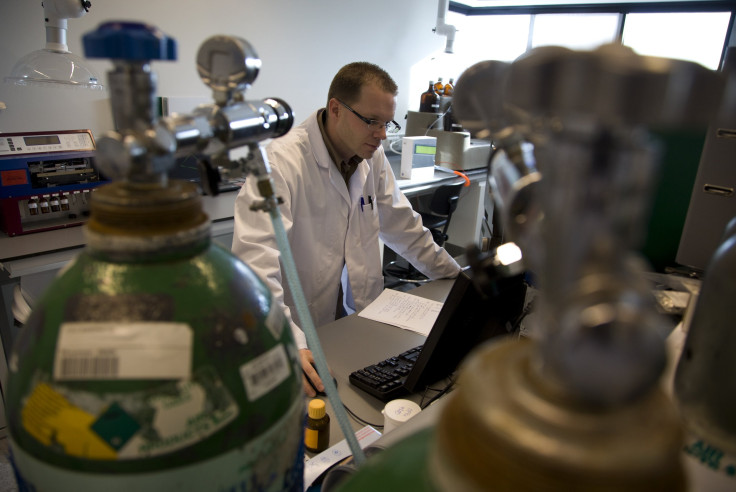BioMarin’s Big Bet: FDA Weighs Approval Of Potential Blockbuster First Drug For Fatal Muscular Disorder

When Nicolas Gonzalez was 4 years old, his babysitter noticed he had trouble climbing stairs. Then on Halloween when Nicolas and his mother, Michelle, went trick-or-treating in their Montgomery, Illinois, neighborhood, he gave up partway through and sat down in the middle of the sidewalk. That’s when Michelle realized something was wrong.
By the age of 9, Nicolas couldn’t walk more than two blocks at a time. When he did run, he did so slowly. Sometimes at the grocery store, he would grow tired and just sit down in the middle of the aisle. Once he did, it was often hard for him to get up.
But after Nicolas’ doctor started him on a clinical trial for a drug called drisapersen, things gradually changed. He began to climb in and out of bed on his own. Soon he started to walk longer distances. “When he had got up from the floor like he couldn't before — that was amazing to me,” his mom says.
In early January, federal regulators will decide the fate of drisapersen. Experts who recently poured over data for the drug from three clinical trials say it doesn't work, but families point to the subtle improvements they've witnessed in boys who have been treated. The Food and Drug Administration recently has championed so-called "patient-focused drug development," but the extent to which such observations factor into the drug approval process is a matter of fierce debate. For now, companies and analysts are watching the drisapersen decision closely as one of a handful of recent cases that could point the way forward.
“I think this is an important case in just how much patient testimony can sway the FDA,” said Heather Behanna, a life sciences analyst with Wedbush Securities. “If it does get approved, that's what it's resting on.”
If the FDA does choose to place more importance on stories such as Nicolas’, that shift could fundamentally reshape the drug approval process. Drumming up support from patients may become as important to companies as submitting high-quality clinical trials. Patients would enjoy more choices for their treatment, but more drugs with questionable safety and efficacy profiles potentially also could slide through, leaving patients and doctors with a greater responsibility to evaluate data and make informed decisions.
Dr. Caleb Alexander — who cast one of those "no" votes just moments after Michelle Gonzalez appeared before the advisory council to share Nicolas' story — is wary of placing too much importance on stories that are inherently subjective and limited in scope. He is an epidemiologist and co-director for the Center for Drug Safety and Effectiveness at Johns Hopkins University.
“I just think it's hard. No epidemiologist would say, ‘OK, it really worked for you and therefore it should be approved,’" he said. "And yet, that's essentially what one hears.”

What Is A Patient’s Role?
Drisapersen, which will be sold under the brand name Kyndrisa if approved, treats a rare disorder called Duchenne muscular dystrophy that affects mostly young boys and causes the muscles in their arms and legs to become weak. Symptoms often start before a boy’s fifth birthday, and the child is usually confined to a wheelchair by age 12. Eventually, the heart and lungs stop working. The disorder is 100 percent fatal and most patients die by their late 20s.
GlaxoSmithKline already had tested and discarded drisapersen when the biotech company BioMarin snatched up its owner Prosensa Holdings for as much as $840 million last January. Now, California-based BioMarin is waiting to hear whether its purchase was in vain. An FDA advisory committee said in a 15-2 vote in November the largest trial weakened the drug's case for efficacy, despite pleas from Michelle Gonzalez and other caregivers campaigning for the drug’s approval.
If drisapersen is approved, BioMarin estimates it could serve a global market worth billions, comprised of patients such as Nicolas with no other treatment options. Meanwhile, BioMarin’s rival Sarepta Therapeutics of Cambridge, Massachusetts, awaits its own FDA review for a competing drug in January.
“This is a greater than a $1 billion market opportunity, by far,” Behanna said. “It's $1 billion to $3 billion worldwide, probably.”
Lately, the FDA enthusiastically has welcomed patient input into drug development and approvals in recognition clinical data does not often capture the nuance of how patients really feel about their results. Last summer, the agency approved a new treatment called Addyi for low sexual desire after twice rejecting it even while experts questioned its safety and efficacy. The decision came after testimony from dozens of patients including a few who took it during clinical trials and swore it worked.
Debra Miller, president and CEO of a nonprofit advocacy group called CureDuchenne, said she believes patient stories can illustrate drisapersen’s benefits more clearly than formal trials. “To me, when you've got a patient, parent and a physician asking for the drug, I definitely think that should carry some weight,” she said.
But Alexander, who served on the FDA’s advisory committees for both Addyi and drisapersen, warned against relying too heavily on anecdotes. "No amount of testimony can take the place of the science,” he said. “It can't be a substitute for the data.”
A Fatal Diagnosis
BioMarin’s injectable drug restores a protein called dystrophin that works together with other proteins to protect muscle fibers from injury. Duchenne patients have a mutation that causes them to lack one of several segments known as exons required to manufacture the muscle-protecting protein. BioMarin's drug enables messenger RNA to skip over a region adjacent to the missing segment when manufacturing dystrophin. This results in a shortened but effective version of the dystrophin protein in muscles.
This technique is called “exon skipping.” Of the 18,000 Duchenne patients in the U.S., only 2,300 harbor a mutation on the particular exons that would qualify them for drisapersen though the company estimates it could reach some 10,000 patients worldwide. It has not yet revealed a price for the treatment.
Dr. Craig McDonald, who specializes in treating neuromuscular diseases at the University of California-Davis and represented BioMarin in front of the FDA advisory committee, said he saw dramatic improvements in several of the 10 patients that he enrolled in clinical trials.
"I've had patients that have really developed functions that we just never see in Duchenne muscular dystrophy patients,” he said. “I've had 10-year-old patients who are essentially running normally. They're even playing soccer with their peers, running up steps, running up skateboarding inclines at parks. It's really pretty remarkable."

There were a few problems with the underlying data, however, according to the FDA and some advisers. In BioMarin’s tests, drisapersen generated negligible changes in patients’ dystrophin levels and didn’t seem to improve their ability to function to a meaningful degree. In one of three clinical trials, those who received drisapersen for 48 weeks walked an average of 35 meters further in a 6-minute walk test than those who took a placebo. Two other trials completely failed to show statistically significant improvements in the walk test after 24 and 48 weeks.
McDonald says patients in those other trials were at a later stage of the disease, did not receive a “load dose” of the drug to jumpstart the treatment at the trials’ start and did not continue for long enough. Miller at CureDuchenne says she has noticed from her close work with families that boys who were on the drug the longest seemed to be doing the best on a host of measures aside from walking.
“There was a disconnect between the data that was being shown and the human experience that I was seeing with these boys,” she said. “A 6-minute walk test is an indicator of disease progression but it may not be the most significant real-life indicator.”
Still, other experts said the company failed to show the drug worked, and cited safety concerns. Some patients developed a reaction in the skin around the spot where the injection was administered, and a few were hospitalized for kidney toxicity and a shortage of platelets, which help blood to clot. Those concerns led the vast majority of FDA advisers to cast a vote that may have sealed drisapersen’s fate, saying the largest trial did not back up the company’s claims the drug was safe or effective.
One Final Chance
Gonzalez testified in support of drisapersen along with several other families before the FDA advisory committee and their trips were paid for by CureDuchenne, which receives unrestricted educational grants from BioMarin. For Alexander, the committee member, those anecdotes were an important part of the conversation but will always remain secondary to the science.
“The threshold is substantial evidence of efficacy and safety and that means more than just, it worked for me and it worked for my friend,” he said.
McDonald, on the other hand, said patient testimony should be a tool that helps experts interpret and contextualize data. “I think it absolutely should be factored in as really important information,” he said. “It was pretty consistent that the families saw benefits to the drug beyond what was observed in the 6-minute walk test."
Gonzalez said she feels perfectly capable of weighing the risks and benefits of drisapersen with Nicolas' doctor. “It's called an informed decision. You discuss it with your doctor and they let you know and you make an informed decision and you monitor,” she said. “That’s what we’re looking for, is options.”
The FDA, meanwhile, carefully is considering the merits of the drug. But Behanna is still skeptical BioMarin will succeed, saying an approval would signal to drug companies the FDA is willing to give patient testimony far more weight than ever before, even when patients disagree with the agency’s own advisers and staff.
“If you do let it through, you really set a precedent for these case studies being the most important part of the approval package and I just don't think the agency is ready to do that,” she said. “But we'll see.”
© Copyright IBTimes 2025. All rights reserved.





















